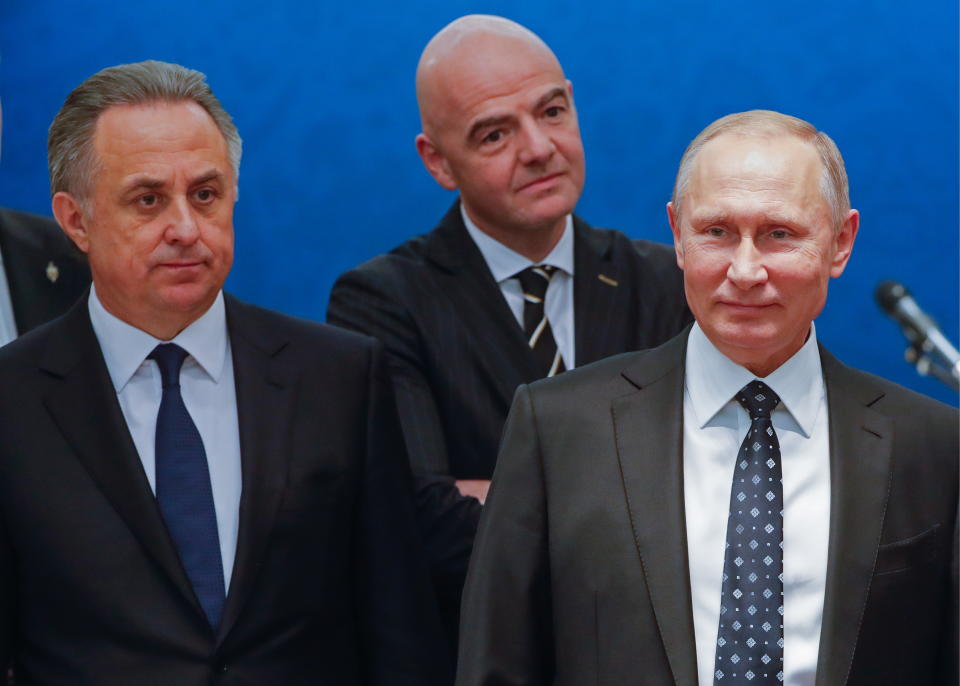Russian whistleblower details soccer doping; will FIFA do anything?

When the Winter Olympics end next week, and the “Olympic Athletes of Russia” no longer command the public’s attention, FIFA will. And soccer’s world governing body will have a lot of questions to answer.
While Russia’s state-sponsored doping program and the wide-ranging scandal that followed focused on the “Olympic sports,” and specifically track and field, the program seemingly extended to soccer. The scandal, for the most part, hasn’t. But it should. And with the 2018 World Cup approaching, FIFA is about to get its four months under the microscope.
Russian whistleblower Grigory Rodchenkov went on record this week to explain the mechanics of Russia’s soccer doping scheme for the first time. As you might expect, the details are incriminating. Rodchenkov told the Associated Press that “Russian footballers were immune from doping-control actions or sanctions.” He claimed that former Russian sports minister Vitaly Mutko had told him directly to “avoid any scandal by hiding positive results.”
“When [Russian players] had [adverse analytical findings],” Rodchenkov said, “those results were supposed to stay out of [WADA’s administration and management system].”
Mutko has been accused of engineering the program, and received a lifetime ban from the International Olympic Committee in December. That came as the IOC – which has itself been criticized for lethargic investigations, inaction and leniency – barred the Russian Olympic Committee from the 2018 Winter Games, but allowed most Russian athletes to compete in PyeongChang under a neutral flag.
The same independent investigation, commissioned by the World Anti-Doping Agency, that spurred IOC action pertained to FIFA as well. When part two of the McLaren Report was released in December 2016, WADA notified FIFA that 34 of the 154 soccer doping samples obtained from a Moscow lab might have been tampered with. According to reports last summer, 23 of the 34 players in question were the 23 members of Russia’s 2014 World Cup squad.
From there, it was on FIFA to investigate. But in late December, Rodchenkov’s lawyer said he had not been contacted by soccer’s governing body. FIFA later claimed it had attempted to establish contact, and now claims it has submitted a list of 59 “specific questions” to the whistleblower, through his lawyer. It recently released a timeline of its investigative efforts. But it has drawn heavy criticism from anti-doping officials for its “exasperating” neglect. And that timeline has been branded “mendacious, misleading, self-serving and evasive.”
Indeed, FIFA’s pursuit of doping evidence, or lack thereof, seems flawed at best. The IOC had to dig into allegations across a number of sports. It came to its decision, albeit a somewhat merciful one, with two months to spare.
FIFA, meanwhile, only has to investigate one sport. If the 18 months that will have passed between the release of part two of the McLaren Report and the World Cup aren’t sufficient for FIFA to tie up all loose ends and come to a conclusion, it has no excuse. It will have failed, and sacrificed any last ounce of integrity it has left.
But it surely will try to come up with an excuse, because what other choice does it have? Russia has spent billions of public dollars preparing to host FIFA’s banner event. Russia’s spending and planning cover more than half a decade. FIFA certainly can’t strip Russia of hosting rights with four months to go, and can’t expel the national team from a tournament at which it will be one of the main domestic attractions.
FIFA could ban individual players if it finds them guilty. But, for one, only five or six holdovers from 2014 are expected to be part of the 2018 World Cup squad. And regardless of the identities of the players, any ban would spark significant controversy – controversy that FIFA is determined to avoid.
FIFA’s interests are clear. First and foremost, it wants to protect Russia. It is beholden to Russia, not the integrity of the sport it governs. It could, at some point, succumb to public pressure and punish the country’s soccer federation or its athletes. It has, after all, claimed an investigation is ongoing.
But it says the analysis of a single individual doping sample takes weeks, implying that the entire investigation will therefore take much longer. FIFA has dodged questions about the possibility that the investigation might not be wrapped up by June. In all likelihood, it will take just long enough to ensure that the World Cup remains conveniently unaffected.
– – – – – – –
Henry Bushnell covers global soccer, and occasionally other ball games, for Yahoo Sports. Have a tip? Question? Comment? Email him at henrydbushnell@gmail.com or follow him on Twitter @HenryBushnell.


